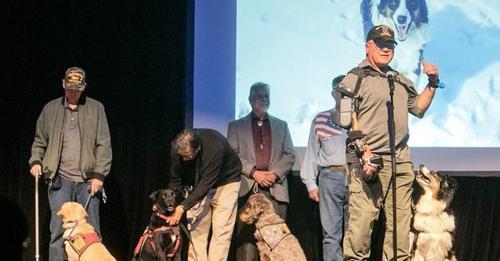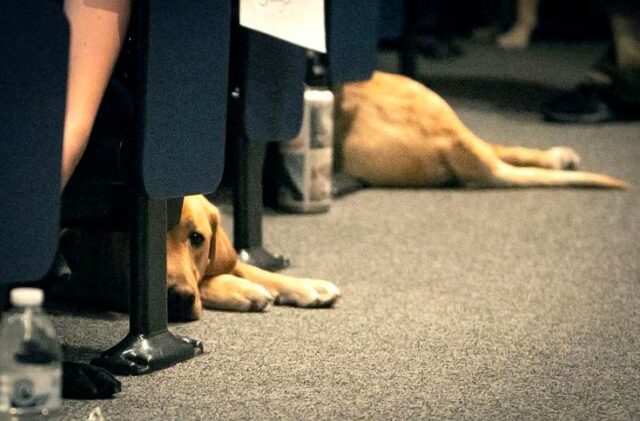A Happy Graduation Day For Assistance Dogs

For a group of furry students who spend their lives aiding those in need, summer school is officially over.
35 newly trained support dogs and their owners celebrated the end of their training with Assistance Dogs of the West by attending a graduation ceremony on Wednesday at the James A. Little Theater at the New Mexico School for the Deaf. It was the organization’s first commencement since 2020 due to the coronavirus pandemic’s delays.
Local nonprofit Assistance Dogs of the West helps people develop the skills necessary to train assistance dogs and matches disabled individuals with service animals.
Mobility issues, autism spectrum disorders, developmental disabilities, seizure disorders, diabetes, and post-traumatic stress disorder are just a few of the conditions that the dogs may aid.

During the ceremony, actress and longtime animal advocate Ali MacGraw said, “Assistance Dogs of the West has incorporated an innovative, powerful educational component where students of all ages, all walks of life, and all abilities learn to train service dogs under the guidance of our professionals.”
The canines wore distinctive red harnesses that served as graduation signs even though there were no hats and gowns present. They will have a variety of futures, just like many people who complete challenging programs.
Some will continue to serve their owners, while others will visit hospitals and courtrooms to console people at their most difficult times.
Some will later use their training to assist warriors with PTSD, such as an Australian shepherd named Hawkeye.

Theodore “Ted” Skibyak, an Army veteran, remembered the night Hawkeye saved his life before beginning the training course.
“I got Hawkeye when he was a pup, and I wasn’t sure if we were going to bond until one night he woke my wife up because I wasn’t breathing very well,” according to Skibyak. “He was just whining and pawing at me, trying to wake me up. Since then, he has been really attached to me.”
According to Skibyak, he has experienced trauma throughout much of his life, including a devastating vehicle accident that cost him the use of his right arm and a year-long combat mission in Iraq. He was eventually given a PTSD diagnosis.
“I’ve been in situations when you’re trying to save a kid, and you can’t, and it eats at you. You wonder what you did wrong. And then you’re in combat and people are shooting at you,” he recalled.

The group’s Warrior Canine Connections program, which pairs veterans with support dogs and instructs them on the training, included Skibyak. He claimed that he had tried to match a dog with him but had not been successful.
According to the organizers, Assistance Canines of the West works to match prospective owners with the ideal canine companion while letting the dogs “choose” their new best friend for life.
“Their dogs can interview a whole bunch of people before they find out who the dog wants to work with,” Skibyak added.
According to Skibyak, he ultimately decided to purchase a puppy from a breeder in Los Lunas and train the canine himself as part of the group’s self-training program, which permits owners to teach their canines to function as service animals.

Skibyak claimed that Hawkeye assists him with daily tasks after completing the required six months of training, including locating goods, opening doors, and pressing buttons.
Many other veterans rely on their companions for emotional support, however, Skibyak claimed that his service dog mostly provides him with physical support.
Army veteran Chuck Zobac claims that Mitzi, his golden lab, helps him maintain his composure and control his PTSD symptoms.
“When the animal is there, and I can talk to or pet the animal, that reduces the tension,” he said.

Mitzi and Zobac were paired after Zobac completed the Warrior Canine Connections program.
“I think the experience has been very positive because not only do they dot the i’s and cross the t’s, but they want to make sure that there’s a compatibility and understanding between the animal and the recipient,” he said.
Mitzi and her owner have developed an unbreakable friendship since the meeting.
“The dog looks at me — and, you know if you’re there and no matter how pretty you are and what kind of candy you have in your hand, the dog will look at me,” said Zobac.
Source: Santa Fe New Mexican
